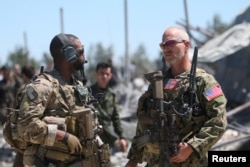Turkish President Recep Tayyip Erdogan is in Moscow for talks with his Russian counterpart Vladimir Putin. The visit comes as Turkish forces are poised to launch a major military operation against the Syrian YPG Kurdish militia.
“We will not seek advice on how to deal with a terrorist group from anyone whose activities have been directed against our citizens for more than 30 years, or ask for permission to fight terrorism,” Erdogan wrote last week in the Russian daily Kommersant.
Ankara deems the YPG and its political affiliate the PYD terrorist organizations linked to an insurgency inside Turkey.
Ankara and Moscow back rival sides in the Syrian civil war, differences that resulted in Turkish jets downing a Russian bomber in 2015. Since then, the two presidents are increasingly cooperating in efforts to end the conflict.
Erdogan and Putin held seven one-on-one meetings in 2018 and 18 phone calls to discuss bilateral ties, especially Syria.
Putin gave the green light to two previous Turkish military operations against the YPG, resulting in a wide area of Syria coming under Ankara’s control.
However, a senior Turkish delegation visiting Moscow in December reportedly failed to get backing for the latest planned operation targeting the YPG in northeast Syria.
International relations professor Huseyin Bagci of Ankara's Middle East Technical University Analysts suggested Erdogan will be seeking to change Putin’s mind.
"Russia is the key player in Syria," he said. "Turkey, together with Russia, is trying to be present in Syria.”
Bagci added, “the problem for Ankara is the Kurds will also be supported by the Russians. The Russians will ultimately put their money on the Kurds and the Syrians, not on Turkey, because Turkey once betrayed the Russians by shooting down their fighter, and the Russians have not forgotten this.”
Former senior Turkish diplomat Aydin Selcen suggested Putin is also using Turkish military threats against the YPG as a means of forcing the militia into making a deal with Damascus.
“Mr. Putin will wait, as opposed to what happened in previous Turkish military operations in Syria," Selcen said. "If PYD reaches a deal with Damascus on the grounds of the Russian offer, and in return, Moscow can guarantee that deal, then Russia will have an interest to discourage Ankara from moving on with a unilateral [military] action.”
Moscow’s leverage over the YPG and PYD is enhanced with U.S. President Donald Trump’s decision last month to withdraw from Syria and end American military support of the militia in the war against Islamic State.
Washington had repeatedly called on the Syrian Kurdish forces to resist calls to make a deal with Damascus and Moscow. Observers point out that with the United States pulling out of Syria, the YPG and PYD have few options other than Damascus, with Turkish forces massed across the border.
Putin is also aware that Trump’s decision to pull out of Syria denies him a key card in his efforts to drag Erdogan away from his traditional NATO ally. Washington's support of the YPG, considered terrorists by Ankara, had poisoned bilateral relations.
On Sunday, Trump and Erdogan spoke for the second time this month.
“The two leaders agreed to continue to pursue a negotiated solution for northeast Syria that achieves our respective security concerns,” the White House said.
Selcen claims a reset in relations is in the offing.
“We’ve had this schizophrenic Turkish foreign policy — being in NATO, working with NATO against Russia in the near abroad. But in the Middle East, we are working with Russia against the U.S. Now, we are getting over this schizophrenic policy, and we are going back to the EU and the United States, NATO and de facto away from Russia.”
But Erdogan still needs to work closely with Putin in Syria. The future of the Syrian Idlib province is also expected to be discussed by the two presidents on Wednesday.
In September, a deal struck by Ankara and Moscow thwarted a Syrian regime offensive to retake the province, which is the rebels' last main holdout. The agreement saw the creation of a demilitarized zone policed by Turkish forces.
With about 3 million people trapped in Idlib, the deal averted a major humanitarian disaster and refugee exodus into neighboring Turkey.
Moscow is now warning that the agreement is in jeopardy, with radical groups seeking control of Idlib.
“Jabhat al-Nusra dominates and violates the demilitarized zone,” said Russian Foreign Minister Sergey Lavrov. “About 70 percent of this territory is already occupied by terrorists. They are trying to attack the Syrian army’s positions, settlements, and they are trying to threaten our military air base in Hmeymim.”








